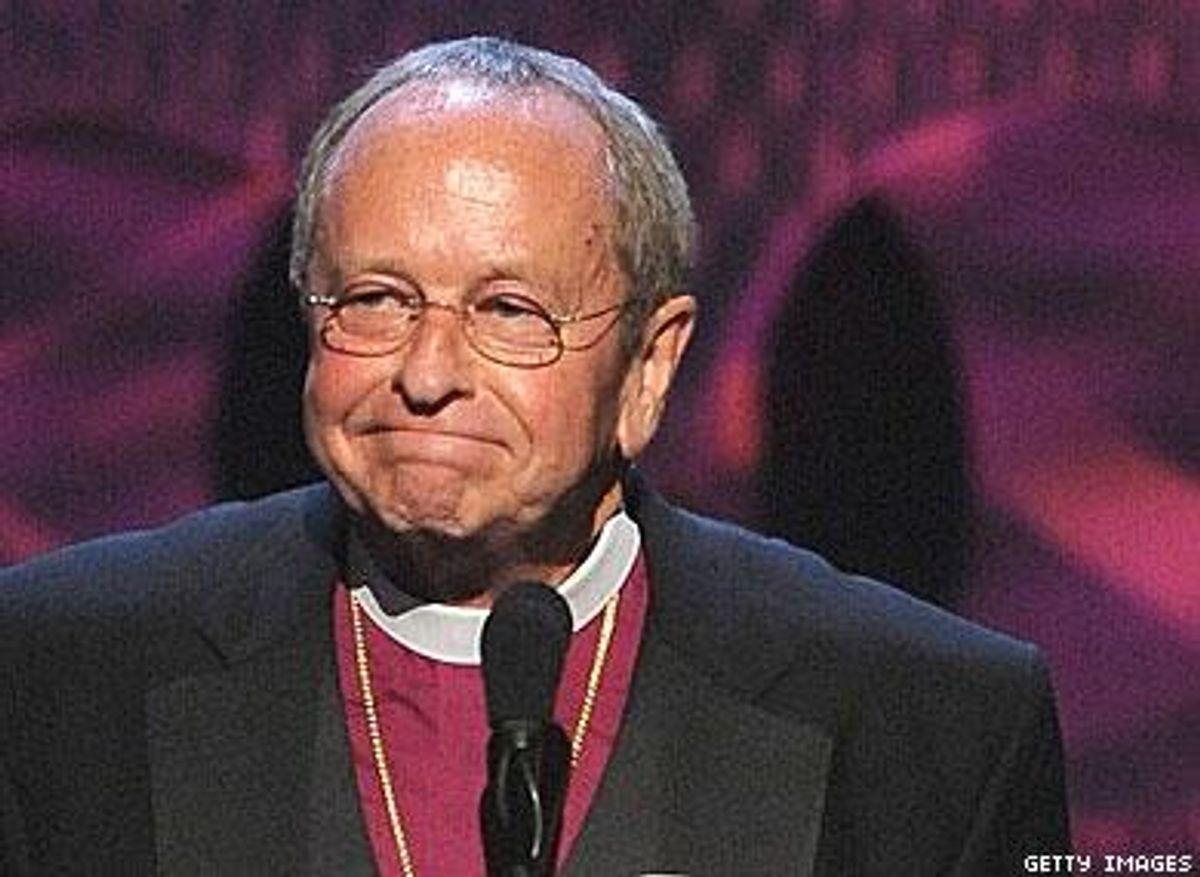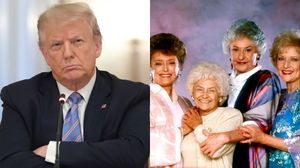CONCORD, N.H. -- The Right Reverend V. Gene Robinson, who nearly a decade ago became the first openly gay bishop in the Episcopal Church and will retire his vestments in less than a year, lives far enough away in the New Hampshire countryside from the presidential primary campaign scrum in Manchester as to render it on another planet.
Perched on the edge of state forest land, the home he shares with his husband, Mark Andrew, is filled with mementos of public and private life: photos of their two granddaughters, beaming shots of the bishop with Sir Ian McKellen and Desmond Tutu, and a framed letter from Barack Obama, then a presidential candidate, congratulating the couple on their 2008 civil union in New Hampshire. It's similar to a recent White House note to a newlywed gay couple in Brooklyn, N.Y., that caused a fresh, if brief, round of speculation last month regarding Obama's position on gay marriage and whether his evolution nears an affirmative answer.
Seeing the GOP campaign careen through the state, Bishop Robinson has taken a pragmatist's approach to the man for whom he provided a pastoral counterbalance to megachurch minister Rick Warren at the 2009 inauguration: He believes it may not be helpful for Obama to endorse marriage equality prior to November, and while he wishes the president would have gone further and faster on the issue, Robinson says his current trajectory is the correct one.
"I have to say I'm sympathetic to the notion that for him to openly support marriage equality before the election would complicate an already difficult task," he says. Were he asked to advise the president on the issue, "I would say to him that we can't underestimate how important this is to us -- this is the systemic change that we need, want, and deserve. And I would push him hard to go all the way to marriage equality in his second administration."
If the barnstorming through New Hampshire over many months hasn't passed down his secluded country road, Robinson, 64, has been actively following the campaign rhetoric, even as he tends to an unrelenting schedule of leading the state's parishes, finishing a book on marriage, and helping to launch a nonviolence project in Washington, D.C., one he says will reach out to "the churched, the unchurched, and the de-churched." The program may mean an upcoming move to the nation's capital.
With Jon Huntsman a bright exception, Robinson says, the social conservative-pandering candidates have faced an inspiring "buzz saw" of opposition on their LGBT positions from young people and state voters, 64% of whom said that the marriage issue has been "settled," according to an internal Republican poll last month. This despite a continued, confusing push in the state legislature to repeal marriage equality and revert marriages of same-sex couples such as Robinson and Andrew back to civil unions (the state had officially upgraded civil unions to marriages a year ago). "People like Rick Santorum and others underestimate the real cultural shift that has taken place here," Robinson says.
But with that cultural shift, in New Hampshire and elsewhere, comes a backlash strategy by social conservative groups that Robinson finds both ridiculous and masterful: sounding the alarm that religious liberty is threatened by LGBT rights and playing the victim card to promote their own wounded agenda.
The National Organization for Marriage has used it for years now, crying foul whenever the word "bigot" is brandished against them and their sympathizers (Santorum and Mitt Romney are among those who have signed the group's "Marriage Pledge," as the Obama campaign has eagerly sought to remind voters). Following news such as Illinois Catholic Charities' 2011 decision to cease providing state-funded adoption services rather than consider gays as potential adoptive or foster care parents, Newt Gingrich railed about the perceived abridgements to religious freedom, posing in a Saturday New Hampshire debate, "Should the Catholic Church find itself discriminated against by the Obama administration on key delivery of services because of the bias and the bigotry of the administration?"
"The bigotry question goes both ways," Gingrich said. "And there's a lot more anti-Christian bigotry today than there is concerning the other side. And none of it gets covered by the news media."
Though Robinson is adamant that using the word "bigot" shuts down any meaningful dialogue between groups who disagree, he also believes that the rhetoric as used by Gingrich plays into socially conservative religious voters' confusion between pain and oppression. "That is to say, I have no doubt that fundamentalist people are in pain over the changes they see in our culture -- the changes surrounding the LGBT community being among them," Robinson says.
On the other hand, "to feel victimized as if somehow they are the new oppressed group is just patently absurd," he says. "This has happened a lot in the church, of people making decisions that have repercussions and then saying that they were victims when they were the ones who made the decisions. The breakaway churches all talk about being driven out," Robinson says of splinter Episcopal congregations that have left the church in recent years to establish their own denomination following Robinson's ordination. "Nobody's driving anybody out. They are the ones who left."
Nevertheless, people supportive of Gingrich or Santorum "absolutely respond positively to that sentiment," he adds. "And it's been a successful tactic. It's also a sign that we have a lot of work to do, because they are not yet ready to accord us the same rights, responsibilities, and privileges as the rest of the citizenry."



















































































